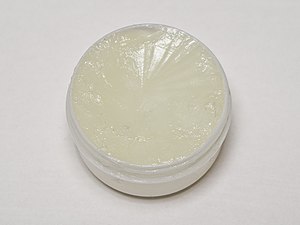Moisturizer

A moisturizer (or moisturiser) is a liquid that is used for softening the skin, especially for naturally dry skins. They increase the skin's water content by reducing evaporation.[1] The thickness of a moisturizer is actually what keeps the hydration concealed into the skin, which then creates the moisturizing effect. Due to its thickening agents, moisturizers typically only come in lotion or night cream form.[2]
Unlike a serum, a moisturizer does not penetrate deeply into the skin. The main job of a moisturizer is to seal products into the skin, locking all the moisture and nutrients your skin needs.
They can be quite a complicated chemical mixture. They may contain naturally occurring skin lipids and sterols, artificial or natural oils, emollients, lubricants,etc.
Moisturizers are not always needed or used. They are most useful for persons with dry skin.
Moisturizers are designed to either impart or restore hydration in the stratum corneum, which is an interactive, dynamic structure, and maintenance of hydration can impact its barrier function.[3]
How they act
[change | change source]Ways that a moisturizer affects the body include:
- Occlusives work by forming a thin film on the surface of the skin to prevent loss of moisture.
- Humectants attract water vapor from the air to moisturize the skin.
- Some add deficient materials. These aim to restore natural moisturizing factors on the skin.
References
[change | change source]- ↑ Publishing, Harvard Health. "Moisturizers: Do they work? - Harvard Health". Harvard Health. Retrieved 2017-11-10.
- ↑ "What are Moisturizers?". 2021-06-03. Retrieved 2021-06-12.
- ↑ Wan, Derrick C.; Wong, Victor W.; Longaker, Michael T.; Yang, George P.; Wei, Fu-Chan (June 2014). "Moisturizing Different Racial Skin Types". The Journal of Clinical and Aesthetic Dermatology. 7 (6): 25–32. ISSN 1941-2789. PMC 4086530. PMID 25013536.
